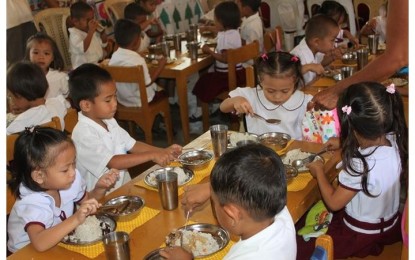
FEEDING PROGRAM. The Department of Social Welfare and Development holds Supplemental Feeding Program for school children in this undated photo. A total of four million children benefited from the program since it started in 2021. (Photo from DSWD)
MANILA – Some four million children have benefitted from the Department of Social Welfare and Development’s (DSWD) Supplemental Feeding Program (SFP) since it started in 2021.
Assistant Secretary Romel Lopez, DSWD spokesperson, said the agency’s continuous implementation of SFP addresses malnutrition and improves the health of young Filipino children.
“This community-based feeding program is being done successfully because of the direct participation of, or in partnership with, the local government units (LGUs),” Lopez said in a news release on Thursday.
The DSWD, he said, promotes and implements the SFP following the directives of President Ferdinand R. Marcos Jr. and the Republic Act (RA) 11037, known as the “Masustansyang Pagkain para sa Batang Pilipino (Nutritious food for Filipino children).”
The SFP, which is also part of the DSWD’s contribution to the government’s Early Childhood Care and Development (ECCD) program, provides food, in addition to the regular meals of children currently enrolled in LGU-managed Day Care Centers and Supervised Neighborhood Play.
Under the SFP, the types of meals usually served to children beneficiaries use indigenous foods and/or locally produced foods equivalent to one-third of Recommended Energy and Nutrient Intake (RENI).
For the 11th Cycle of SFP implemented in the school year 2021-2022, a total of 1,993,377 children were served nutritious meals surpassing the annual target by 2.9 percent.
For the 12th cycle of the program, which started in August 2022, some 1,855,954 children were served as of June 2023.
Aside from SFP, the DSWD also implements the Bangsamoro Umpungan sa Nutrisyon (BangUN) Project to combat malnutrition among children and provide health support to pregnant and nursing women in the Bangsamoro Autonomous Region in Muslim Mindanao (BARMM).
In 2022, the BangUN Project served 18,657 children and 3,343 pregnant and nursing women.
The DSWD, as the chair of the Inter-Agency Task Force on Zero Hunger (IATF-ZH), vowed to continue to collaborate with concerned agencies, LGUs and development partners to address hunger, ensure food security and decrease stunting among poor Filipino children. (PNA)
